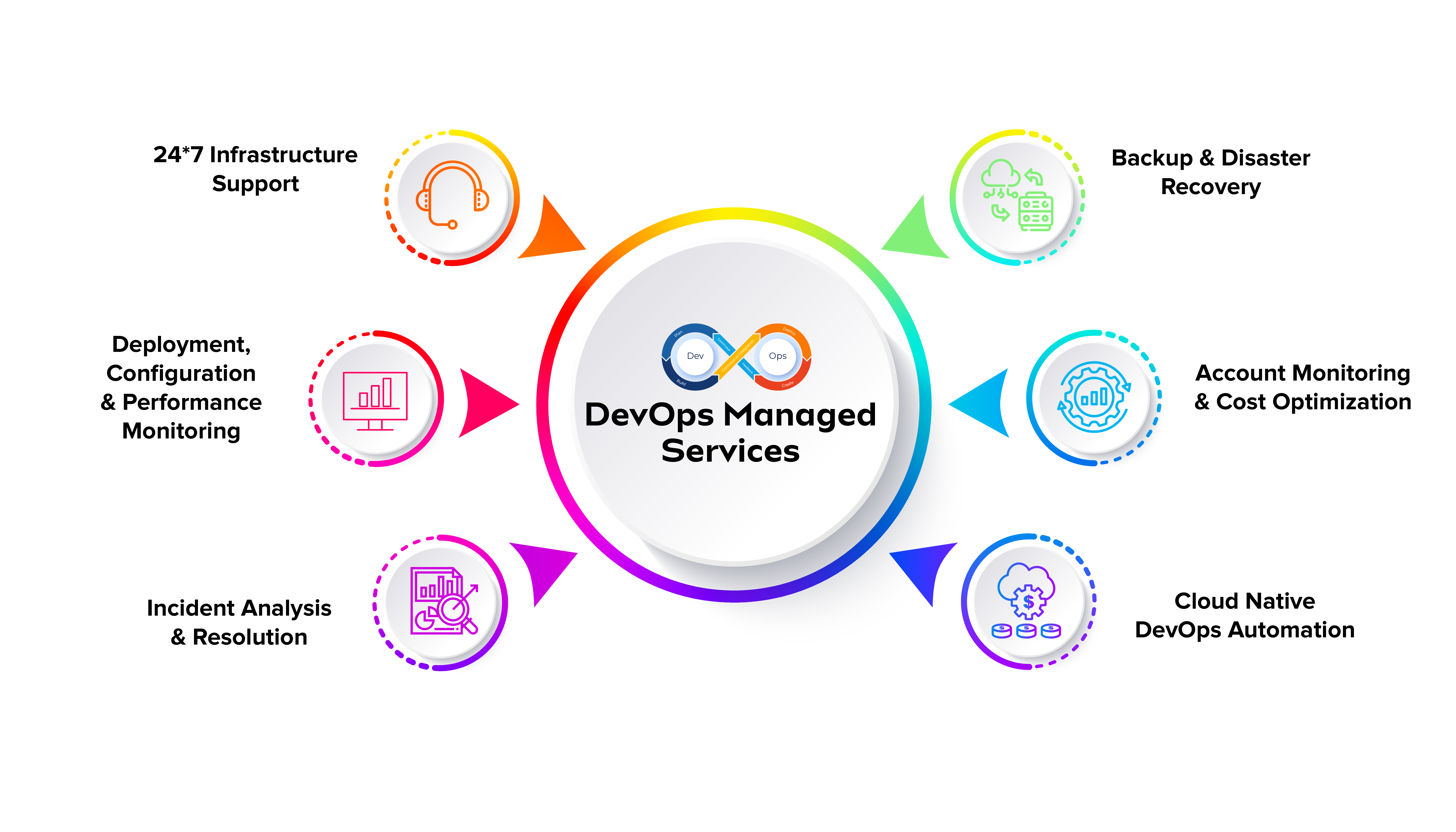Companies today rely on streamlined Software Development Life Cycles (SDLC) to stay ahead of the competition and meet customer demands.
One approach that has gained immense popularity in recent years is DevOps. DevOps practices bring together development and operations teams, breaking down silos and fostering collaboration throughout the SDLC.
To make the most of DevOps, many organizations are turning to DevOps managed services. In this blog, we’ll explore what DevOps managed services are, why they are essential, and how they can supercharge your SDLC.
What Are DevOps Managed Services?
DevOps managed services are a strategic outsourcing approach that allows organizations to offload the management of their DevOps tools, processes, and infrastructure to a specialized service provider.
These services encompass a wide range of activities, from designing and implementing DevOps pipelines to continuously monitoring and optimizing them. The goal is to enable businesses to focus on their core competencies while experts handle the DevOps aspects efficiently.

The DevOps Landscape
Before delving into the benefits of DevOps managed services, let’s take a more in-depth look at the DevOps landscape. DevOps is a cultural and technical shift that aims to shorten the software development lifecycle and improve the quality of software releases. It involves the integration of development (Dev) and IT operations (Ops) to automate and streamline the delivery process.
DevOps practices encompass:
1. Continuous Integration (CI):
CI involves automatically integrating code changes into a shared repository multiple times a day. Automated tests are run to ensure code quality and identify issues early in the development process.
Continuous integration is pivotal in ensuring that code changes do not introduce new bugs or conflicts with existing code. By automating the integration process, DevOps teams reduce the likelihood of merge conflicts and make it easier to detect and rectify issues early in the development cycle.
2. Continuous Delivery (CD):
CD extends CI by automating the deployment of code changes to production or staging environments. It ensures that software can be released at any time with confidence.
Continuous delivery goes hand in hand with continuous integration, allowing organizations to automate the deployment of tested code changes. This not only accelerates the release process but also ensures that each release is reliable and consistent.
3. Infrastructure as Code (IaC):
IaC treats infrastructure provisioning and management as code, allowing for automated, consistent, and repeatable infrastructure deployment.
Infrastructure as code enables DevOps teams to define infrastructure requirements in a code format, making it easier to provision and manage infrastructure resources. This approach enhances the reproducibility and scalability of infrastructure setups, reducing the risk of configuration drift.
4. Monitoring and Feedback:
Monitoring and feedback mechanisms help teams detect and respond to issues quickly, ensuring that software is always in a reliable and stable state.
Effective monitoring and feedback are essential for identifying performance bottlenecks, security vulnerabilities, and other issues that may impact software quality and user experience. With the right monitoring tools and feedback loops in place, DevOps teams can proactively address issues before they affect end-users.
Why DevOps Managed Services?
DevOps managed services offer several compelling advantages for organizations aiming to streamline their SDLC:
1. Expertise and Best Practices:
DevOps managed service providers are experts in DevOps tools, practices, and methodologies. They bring a wealth of experience and best practices to the table, ensuring that your DevOps processes are optimized for efficiency and quality.
Partnering with a DevOps managed service provider means gaining access to a team of experts who are well-versed in the latest DevOps trends and technologies. This expertise can help you implement industry best practices, avoid common pitfalls, and continuously improve your DevOps processes.
2. Cost Savings:
Outsourcing DevOps operations can be cost-effective. You eliminate the need to hire and train in-house DevOps experts, invest in infrastructure, and maintain costly tools and software licenses. Instead, you pay for the services you use.
DevOps managed services provide a predictable cost structure, making it easier to budget for your DevOps needs. Additionally, these services often offer economies of scale, allowing you to access advanced tools and technologies at a fraction of the cost of acquiring them independently.
3. Scalability:
DevOps managed services are scalable, allowing you to adapt quickly to changing workloads and project demands. Whether you’re launching a new product or experiencing a surge in traffic, you can easily scale your DevOps processes without major disruptions.
Scalability is a crucial aspect of modern software development. DevOps managed services can rapidly scale resources up or down, ensuring that your infrastructure and processes can handle fluctuating demands without compromising performance or reliability.
4. Enhanced Security:
Security is a top concern in software development. DevOps managed service providers have robust security practices in place, ensuring that your code, infrastructure, and data are protected from vulnerabilities and threats.
Security should be an integral part of your DevOps practices. DevOps managed services can help you implement security best practices, conduct regular security assessments, and stay up-to-date with the latest security threats and solutions.
5. Focus on Core Competencies:
By outsourcing DevOps management, your development teams can focus on what they do best – writing code and creating innovative solutions. This concentration on core competencies leads to improved productivity and faster time-to-market.
Focusing on core competencies allows your organization to allocate more resources to innovation and product development. DevOps managed services handle the operational aspects, freeing up your teams to focus on delivering value to customers.
6. 24/7 Support:
DevOps managed service providers offer round-the-clock support and monitoring. This means that issues can be addressed promptly, reducing downtime and minimizing the impact on your customers.
The 24/7 support provided by DevOps managed services ensures that your systems remain available and performant at all times. This level of support is crucial for maintaining a positive user experience and meeting service level agreements.
To delve deeper into how DevOps managed services can benefit your organization, you can refer to this article on our blog.

Implementing DevOps Managed Services
Now that we understand the advantages of DevOps managed services, let’s explore how to implement them effectively:
1. Assess Your Needs:
Begin by conducting a thorough assessment of your organization’s current DevOps processes, tools, and infrastructure. Identify pain points and areas where improvement is needed.
Assessing your organization’s needs is the first step toward a successful DevOps transformation. Understanding your current state helps you define clear goals and objectives for the adoption of DevOps managed services.
2. Choose the Right Provider:
Select a DevOps managed service provider that aligns with your goals and has a proven track record. Look for a provider that offers a range of services tailored to your specific needs.
Choosing the right provider is a critical decision. Consider factors such as the provider’s expertise, industry experience, customer references, and the scalability of their services to ensure a good fit with your organization’s requirements.
3. Define Objectives and Metrics:
Set clear objectives and key performance indicators (KPIs) to measure the success of your DevOps initiatives. This could include metrics related to deployment frequency, lead time, and mean time to recovery (MTTR).
Establishing objectives and metrics provides a roadmap for your DevOps transformation. It helps you track progress, identify areas for improvement, and ensure that your DevOps efforts align with business goals.
4. Collaboration and Communication:
Effective collaboration between your internal teams and the managed service provider is crucial. Ensure that communication channels are open, and roles and responsibilities are well-defined.
Collaboration and communication are essential for a smooth DevOps implementation. Foster a culture of collaboration, encourage knowledge sharing, and establish regular communication cadences to keep all stakeholders informed and engaged.
5. Continuous Improvement:
DevOps is all about continuous improvement. Regularly review and optimize your DevOps processes, incorporating feedback and lessons learned to drive ongoing enhancements.
Continuous improvement is a core principle of DevOps. Embrace a culture of experimentation and learning, and use data-driven insights to make informed decisions and refine your DevOps practices over time.
Conclusion
DevOps managed services offer a powerful solution for organizations seeking to streamline their SDLC. By leveraging the expertise and support of specialized service providers, businesses can achieve faster, more reliable software delivery, reduce costs, and focus on their core competencies. The DevOps landscape is constantly evolving, and DevOps managed services can help you stay competitive in today’s digital era.
To learn more about the latest trends and insights in DevOps, visit our blog at ISmile Technologies. Embrace the DevOps revolution, and watch your SDLC become more efficient and agile than ever before. If you have any questions or would like to discuss how DevOps managed services can benefit your organization, please feel free to contact us.










